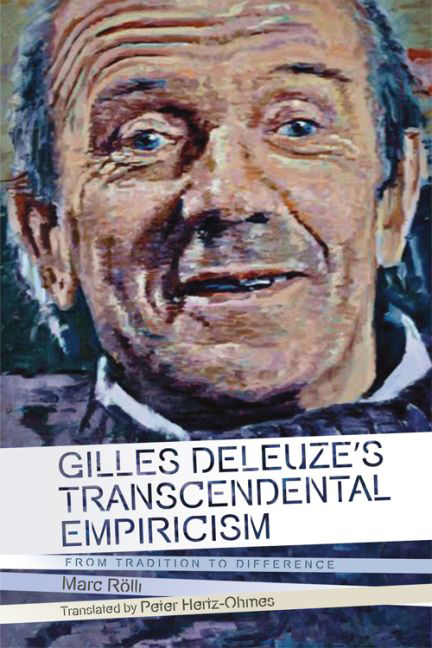Book contents
- Frontmatter
- Contents
- Translator's Note
- Author's Foreword
- Introduction: Can Empiricism Have a Transcendental Aspect?
- PART I EMPIRICISM/TRANSCENDENTALISM
- 1 Hume's Logic of External Relations
- 2 The Ambiguity of Kantian Thought
- 3 Kant's Transcendental Critique of Classical Empiricism
- PART II FROM PHENOMENON TO EVENT
- PART III DELEUZE'S TRANSCENDENTAL EMPIRICISM
- Conclusion: Where Do We Go from Here? Lines of Flight
- Bibliography
- Index
2 - The Ambiguity of Kantian Thought
from PART I - EMPIRICISM/TRANSCENDENTALISM
Published online by Cambridge University Press: 27 April 2017
- Frontmatter
- Contents
- Translator's Note
- Author's Foreword
- Introduction: Can Empiricism Have a Transcendental Aspect?
- PART I EMPIRICISM/TRANSCENDENTALISM
- 1 Hume's Logic of External Relations
- 2 The Ambiguity of Kantian Thought
- 3 Kant's Transcendental Critique of Classical Empiricism
- PART II FROM PHENOMENON TO EVENT
- PART III DELEUZE'S TRANSCENDENTAL EMPIRICISM
- Conclusion: Where Do We Go from Here? Lines of Flight
- Bibliography
- Index
Summary
Of all philosophers, Kant is the one who discovers the prodigious domain of the transcendental. He is the analogue of a great explorer – not of another world, but of the upper or lower reaches of this one. But what exactly does he do?
(Deleuze 1994: 135)Recent French philosophy of difference seldom refers to Kantian philosophy. Diverse references regarding the dependence of French postwar philosophy on Hegel, Husserl and Heidegger as well as on Marx, Freud and Nietzsche are so extensive that hardly any room remains for consideration of their relationships to Kant. With the exception of Lyotard's Lessons on the Analytic of the Sublime, such neglect seems justified, because already familiar dialectical, phenomenological or ontological interpretations of Kant are the rule, at least in the area of the aforementioned ‘poststructuralist’ philosophy. This assessment of the situation is unfortunately superficial. Deleuze's position regarding critical philosophy can indeed characterise his project of transcendental empiricism in its entirety. It is significant that Deleuze takes as his starting point the ambiguity of Kantian thought. On the one hand it grounds the ‘reign of representation’ while on the other hand it has the critical resources at its disposal which, if properly applied, can undermine precisely this reign. Thus to a large extent Kant's thought defines for Deleuze the framework of philosophical practice, because it points out the problem areas of epistemology, ethics and aesthetics and at least partially anticipates their proper treatment.
This chapter tracks the essential points of Deleuze's planned empiricist radicalisation of transcendental philosophy. The first section of the chapter reviews Deleuze's explicitly formulated critical attitude toward Kantian philosophy, while the second part examines certain systematic problems having to do with the transcendental critique of empiricism. This should clarify how transcendental empiricism manages rigorously to transpose the two classic positions and then go beyond them.
Kant and Nietzsche: Initial Discrediting of Truth, Reason and Harmony
In the works of Deleuze there are two popular comments that relate to Kant. Curiously enough, they describe seemingly contradictory positions. The chronologically prior comment is found in the context of a methodological reflection on the writing of a history of philosophy.
- Type
- Chapter
- Information
- Gilles Deleuze's Transcendental EmpiricismFrom Tradition to Difference, pp. 34 - 50Publisher: Edinburgh University PressPrint publication year: 2016



